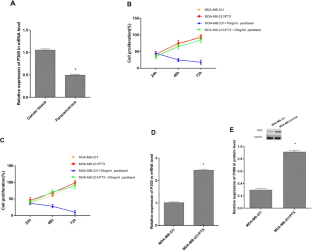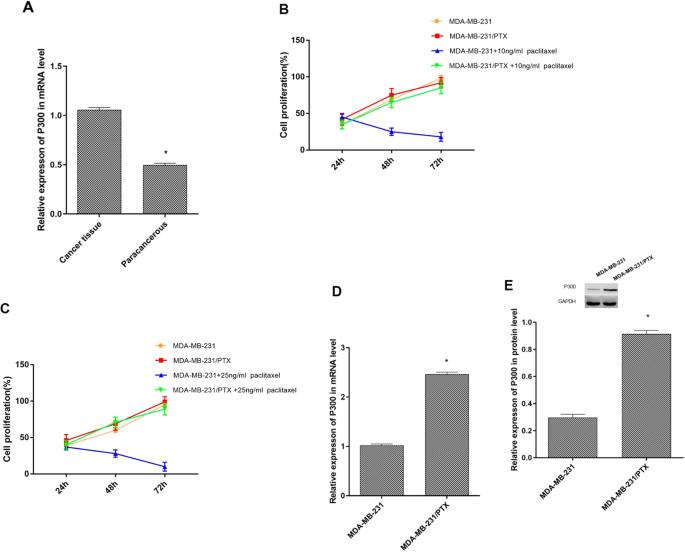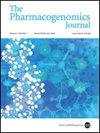Upregulation of p300 in paclitaxel-resistant TNBC: implications for cell proliferation via the PCK1/AMPK axis
IF 2.9
3区 医学
Q2 GENETICS & HEREDITY
引用次数: 0
Abstract
To explore the role of p300 in the context of paclitaxel (PTX) resistance in triple-negative breast cancer (TNBC) cells, focusing on its interaction with the phosphoenolpyruvate carboxykinase 1 (PCK1)/adenosine monophosphate-activated protein kinase (AMPK) pathway. The expression of p300 and PCK1 at the messenger ribonucleic acid (mRNA) level was detected using a quantitative polymerase chain reaction. The GeneCards and GEPIA databases were used to investigate the relationship between p300 and PCK1. The MDA-MB-231/PTX cell line, known for its PTX resistance, was chosen to understand the specific role of p300 in such cells. The Lipofectamine™ 3000 reagent was used to transfer the p300 small interfering RNA and the overexpression of PCK1 plasmid into MDA-MB-231/PTX. The expression levels of p300, PCK1, 5′AMPK and phosphorylated AMPK (p-AMPK) were determined using the western blot test. In TNBC cancer tissue, the expression of p300 was increased compared with TNBC paracancerous tissue (P < 0.05). In the MDA-MB-231 cell line of TNBC, the expression of p300 was lower than in the PTX-resistant TNBC cells (MDA-MB-231/PTX) (P < 0.05). The PCK1 expression was decreased in the TNBC cancer tissue compared with TNBC paracancerous tissue, and the PCK1 expression was reduced in MDA-MB-231/PTX than in MDA-MB-231 (P < 0.05) indicating that PCK1 was involved in the resistance function. Additionally, p-AMPK was decreased in MDA-MB-231/PTX compared with MDA-MB-231 (P < 0.05). The adenosine triphosphate (ATP) level was also detected and was significantly lower in MDA-MB-231/PTX than in MDA-MB-231 (P < 0.05). Additionally, cell proliferation increased significantly in MDA-MB-231/PTX at 48 and 72 h (P < 0.05) suggesting that MDA-MB-231/PTX cells obtained the resistance function which was associated with AMPK and ATP level. When p300 was inhibited, p-AMPK and ATP levels elevated in MDA-MB-231/PTX (P < 0.05). When PCK1 was suppressed, the ATP consumption rate decreased, and cell proliferation increased (P < 0.05). However, there were no changes in p300. In MDA-MB-231/PTX, p300 can inhibit p-AMPK and ATP levels by inhibiting PCK1 expression. Our findings suggest that targeting p300 could modulate the PCK1/AMPK axis, offering a potential therapeutic avenue for overcoming PTX resistance in TNBC.


紫杉醇耐药 TNBC 中 p300 的上调:通过 PCK1/AMPK 轴对细胞增殖的影响。
目的探讨p300在三阴性乳腺癌(TNBC)细胞的紫杉醇(PTX)抗性中的作用,重点研究其与磷酸烯醇丙酮酸羧激酶1(PCK1)/腺苷酸单磷酸激活蛋白激酶(AMPK)通路的相互作用:采用定量聚合酶链反应检测信使核糖核酸(mRNA)水平上 p300 和 PCK1 的表达。利用 GeneCards 和 GEPIA 数据库研究 p300 和 PCK1 之间的关系。为了了解 p300 在此类细胞中的特殊作用,研究人员选择了以 PTX 抗性著称的 MDA-MB-231/PTX 细胞系。使用 Lipofectamine™ 3000 试剂将 p300 小干扰 RNA 和 PCK1 过表达质粒转入 MDA-MB-231/PTX。采用Western印迹检测p300、PCK1、5'AMPK和磷酸化AMPK(p-AMPK)的表达水平:结果:与 TNBC 癌旁组织相比,p300 在 TNBC 癌组织中的表达增加(P 结论):在MDA-MB-231/PTX中,p300可通过抑制PCK1的表达来抑制p-AMPK和ATP水平。我们的研究结果表明,以 p300 为靶点可以调节 PCK1/AMPK 轴,为克服 TNBC 对 PTX 的耐药性提供了一条潜在的治疗途径。
本文章由计算机程序翻译,如有差异,请以英文原文为准。
求助全文
约1分钟内获得全文
求助全文
来源期刊

Pharmacogenomics Journal
医学-药学
CiteScore
7.20
自引率
0.00%
发文量
35
审稿时长
6-12 weeks
期刊介绍:
The Pharmacogenomics Journal is a print and electronic journal, which is dedicated to the rapid publication of original research on pharmacogenomics and its clinical applications.
Key areas of coverage include:
Personalized medicine
Effects of genetic variability on drug toxicity and efficacy
Identification and functional characterization of polymorphisms relevant to drug action
Pharmacodynamic and pharmacokinetic variations and drug efficacy
Integration of new developments in the genome project and proteomics into clinical medicine, pharmacology, and therapeutics
Clinical applications of genomic science
Identification of novel genomic targets for drug development
Potential benefits of pharmacogenomics.
 求助内容:
求助内容: 应助结果提醒方式:
应助结果提醒方式:


